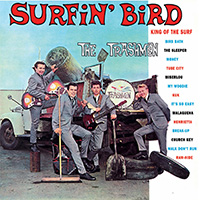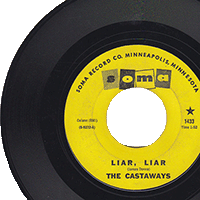Fake Buddy Miles Fiasco: 1971
April 10, 1971
In late 1970 Magoo’s had become the Cafe Extraordinaire, owned by Bobby and Doris Jackson. They started with a Jazz Festival, bringing in such big names as the Elvin Jones Quintet, Joe Henderson, Eddie Harris and his Quartet, Kenny Burrell, and Freddy Hubbard. The people just didn’t respond, so in December 1970 the format switched to soul, featuring acts such as Zulu and Showtime I and II.
The Jacksons booked Buddy Miles to appear on April 10, 1971. An article promised sidemen Andrew Lewis on clarinet and organ, Marlo Henderson on guitar, Charlie Karp on lead guitar, Dave Hull on bass, Tom Hall on trumpet, Hank Redd on tenor sax, Mike Fugate on trumpet, and Stemsy Hunter on sax.
But things went awry. Tom Behr shared the story on Facebook:
[My] brother Bob was an agent and the club owner asked him to book Buddy Miles. When Miles’ agent said he’d need a deposit to lock the date in, the club owner told Bob that he would take over the negotiations and send in the deposit. Then Bob was told that Buddy would be coming without the Express Band, so Jr. Trejo’s Saxon Soul was asked to sit in as Buddy’s back up band.
Here’s where the story gets better: Jr. said they had a rehearsal the afternoon of the show and Buddy played drums, but asked Jr.’s singer to sing his songs because he had laryngitis.
The crowd was beginning to sense there was scam going on. [Apparently someone recognized the keyboard player’s B3, which was covered with a blanket, and that’s when people realized something was up.] On the first break Jr. told the club owner that he finally figured out this guy was a sham and they were going to pull the plug on the show. [Jackson] said, “You better play or the crowd will trash the club not to mention your equipment!” Then he says “Hey Jr. can you play something by Chicago?” (I’m serious)
So as soon as they start to play the second set, people where booing, and throwing food, then drinks at the band, one by one the guys get off the stage, leaving “Buddy” to play a drum solo. Now as the riot is on, fake Buddy jumps off the drums, tosses off his Afro wig and out the back door he ran. The epilogue gets better: the Trib had a picture on the front page of the wig sitting on a table with a bunch of beer mugs, and it turned out the fake Buddy Miles was the janitor at Sacred Heart Church on the East side. I’m still laughing at that one!!
Marshall Fine was suspicious; in his review of April 12 he noted that:
- “Miles” was obviously wearing an Afro wig.
- Miles was fatter than “Miles.”
- Miles has a huge ego, but “Miles” stayed in the background in a dark stage.
- “Miles” only sang backup, while at a previous Labor Temple show, Miles “dominated his group with his thin voice, heavy-handed mannerisms and tiresome drumming.”
- “Miles” “did a drum solo at the end that was superior to anything Buddy Miles has done.”
From the Minneapolis Tribune, April 12, 1970 (Terry Farrell):
Youths rip club during disturbance
About 1,000 young people went to the New Cafe Extraordinaire late Saturday to hear black drummer-singer Buddy Miles and got “ripped off,” youthese for “taken.”
So, some of them decided to rip off the Cafe Extraordinaire, 2933 Nicollet Av. And they did.
They smashed the plush music club’s interior stained-glass windows, overturned and smashed tables, damaged some of the band’s equipment, emptied a fire extinguisher on a rug, tore open cash registers and a cigarette machine, broke a plate glass window, hurled glass mugs about the room, and then pushed out onto Nicollet Av.
Police were called about midnight, shortly after the eruption began. Squad cars quickly blocked off that portion of Nicollet. Policemen began to disperse the crowds and about an hour after the disturbance began it was all over.
It began when the predominantly black crowd realized that the performer who claimed to be Miles was an impersonator. And each of them had paid $5 a ticket.
Club owner Bobby Jackson, sitting amidst the ruins of the club, Sunday said he is not “at liberty to say what went on” concerning the impersonation. But, he added, “all responsibility should lie with the real Buddy Miles. A contract was signed with him.”
Jackson, in good spirits despite the loss of a night’s sleep and what he estimated to be $50,000 in damage to his two clubs (the New City Opera House adjoins the Extraordinaire) said “somebody slipped along the line.”
He said he did not think that his insurance would cover the damage to the clubs, valued at $1450,000. “There’s no way we can reopen.”
Jackson, 29 and black, said he “would go back to playing drums for $100 a week.”
He said that when the incident began he “split – there was no reason to stay.” He said he grabbed money from two cash registers and went home.
Soon after Jackson left, the police arrived. For the most part, though at times, gruff, they were restrained and efficient in dispersing the crowds. However, at least one incident did occur.
About six policemen led by an officer and with a police dog, crossed from in front of the clubs to the west side of Nicollet Av.
The officer, billy club extended, shouted to the people who lined the sidewalk to “move it. Go on, get out of here. One black man did not move fast enough. The officer kicked him in the groin, and he was picked up off the sidewalk by two other policemen to a squad car. Another man was also arrested.
No injuries were reported by police. The two men were arrested on charges of breach of the peace, failure to obey an officer and obscenity in public, police said.
Marshall Fine shed more light on the situation on April 15, revealing that the back-up band was called Saxon, led by Gary Winkler. The band had been hired to back Miles, and worked hard to learn the material. They met “Miles” just before the show, and noticed that “He was too skinny, and his hair looked fake.” Then Winkler was told that Miles had laryngitis, and that he’d have to sing all his numbers. Winker reported that when he realized the hoax, “I was embarrassed, man, like really ashamed. It got to the point where I was signing with my back to audience, I was so ashamed.”
It was after the second set started that the crowd turned. “Miles” hit the back door, and owner Jackson hit another door with $7,500 to $10,000 of the ticket money. Neither “Miles” nor Saxon got all the money they were promised. KUXL disc jockey Jimmy Smith, who had emcee’d the show, told Fine that he looked for Jackson, but his apartment had been cleared out and his phone cut off. This turned out not to be true; a subsequent article says that he had come to the police station and given a statement. He told police that when the hoax was discovered he had started refunding money, but was overcome by the crowd and left.
Another article by the Tribune’s Howard Erickson gave this as Jackson’s account:
Although some patrons became upset at what they considered deception and demanded their money back, “most of the people were satisfied, I think.” He said refunds were being made at the box office when “two, maybe three guys started making a big scene. One of them threw a beer bottle through a stained-glass window, hollered ‘Phoney,’ and fired a pistol. That got the whole audience panicky. The band left the stage and everybody else headed for the exits, fast. That’s what produced the damage – most of it was accidental from the crowd’s haste.”
Apparently the real Miles had been in town, but when he didn’t get the front money he was promised, he cancelled and went back to Boston, where he was during the whole thing.
The event was reported in Rolling Stone on May 13, 1971, in an article rather harshly entitled “You’re Not Buddy Miles, You Pig.” The last paragraph reads:
The real Buddy was not available for real comment, but his company, Mercury, claimed that Miles’ manager cancelled out of the gig the day before because Jackson had come up with only $500 of the $1500 deposit required by the contract.
PERRY PEOPLES
Regardless of whether he also worked as a church janitor, the imposter was actually an accomplished local drummer. Perry Carson Peoples, Sr., 40, had been performing around town for decades – one note said he played for the Stan Haugesag Orchestra for many years. In 1958 he led his Interpreters of Jazz at St. Paul’s Red Feather. Members of the combo included Hensley Hill on flugelhorn, Woodson Bush on alto, Irv Williams on tenor, Tim O’Donnell at the piano, David Facen, bass, Ira Pettiford. The group also presented a concert in 1958 at Macalester College. In 1963 Peoples was in Irv William’s Quartet.
Peoples was born in Kansas in 1928, one of nine children. In 1940 the family was living at 706 Rondo Street in St. Paul, and his father was a singer, employed under a WPA project. Three of his sisters were maids. The family had apparently moved to Minnesota in about 1935.
Although an article on Peoples identified him as a professional musician for 25 years, it also quoted him as saying he was the chief engineer at a St. Paul “institution” which he did not identify. In 1972 he was working as the maintenance manager at Crystler City (6800 Wayzata Blvd. in Golden Valley, now the site of Menard’s). But he was back working in music in 1978-1980. In 1980 his son, Perry Peoples, Jr., was convicted of murdering his common-law wife and sentenced to 15 years in Stillwater. The son died in 1986. References to Perry, Sr. end in 1989 with a letter to the editor indicating that he now lived in North Minneapolis. He died on January 16, 2003.
Both Marshall Fine and Terry Farrell reported that Peoples said that he did not know that he was impersonating Miles and that Jackson had hired him to play “on my own merits.”
END OF THE EXTRA-ORDINAIRE
The incident was investigated by police, and detectives had taken the matter to the county attorney’s office for review, but the it was found that “There wasn’t sufficient evidence for us to prove a felony by any particular individual.” Dayton’s refunded money to those who had bought their tickets there.
However, although no criminal charges were brought, the Minneapolis license inspector recommended that the City Council revoke Jackson’s beer license. And as it turned out, Jackson lost his liquor license for a bad check. Jackson had paid for his license renewal with a check for $650, which bounced. He came back and was able to pay $300 on acccount, and was told to pay the other $350 on April 12, but when he came back to pay the balance, he was refused. When he asked for the original $300 back, the treasurer’s office refused to give it to him. Alderman Robert Denny told him that he “was lucky to get out with that,” and that if the whole $650 had been good, he would have probably lost that “for other reasons,” meaning the riot. As Jackson left the committee room, he was heard to say, “They’re all a bunch of liars in there, man.”
CODA
One of the men arrested on the night of the riot was Oscar Thomas Govan. He was found guilty of making inflammatory statements when the police were clearing the area. Officers testified that he had shouted things like “Kill the pigs,” “Burn the squad cars,” and “Get bricks.” Tribune reporter Terry Farrell (see above) testified that Govan had been kicked in the groin by a police officer and knocked to the ground during the arrest, but the judge said that that was irrelevant. (Govan, a Marine who was wounded by a land mine in Vietnam, received 100 percent disability payments.) He received a suspended sentence of 30 days in the workhouse. Govan died in 1988 at the age of 40.


